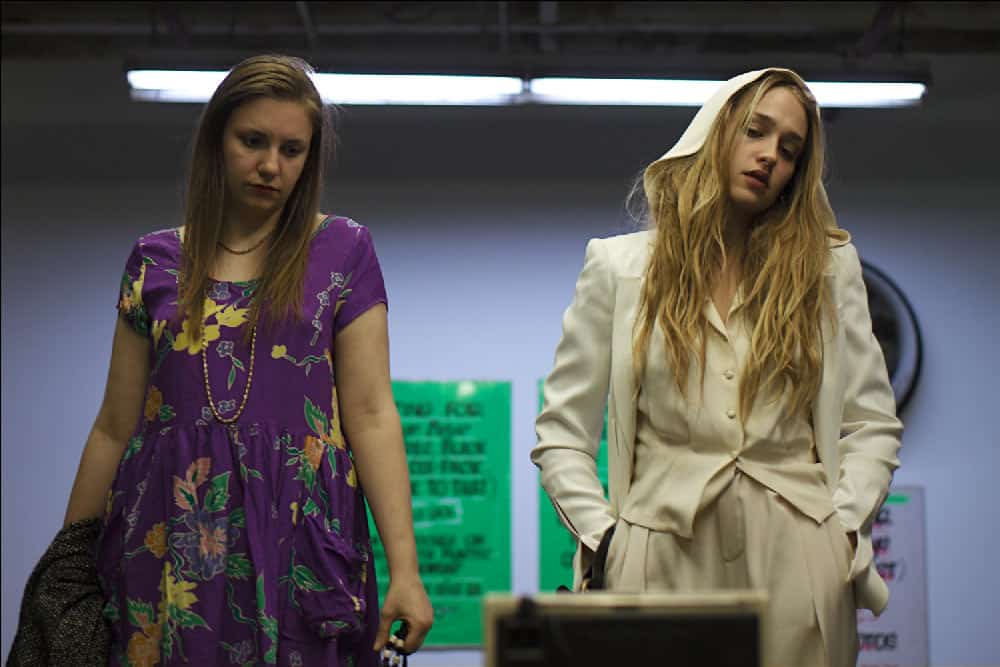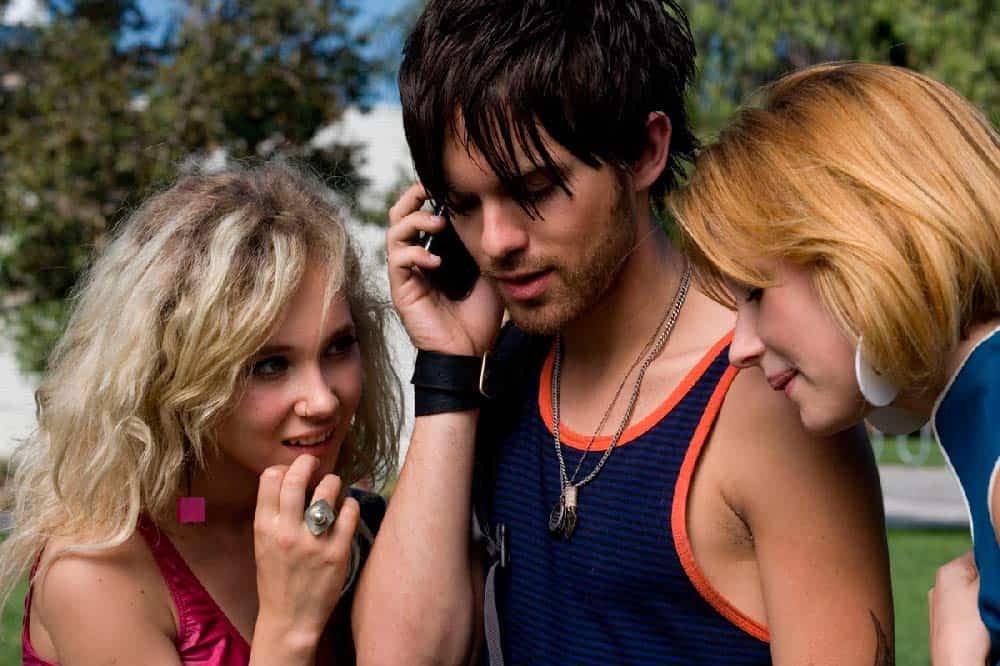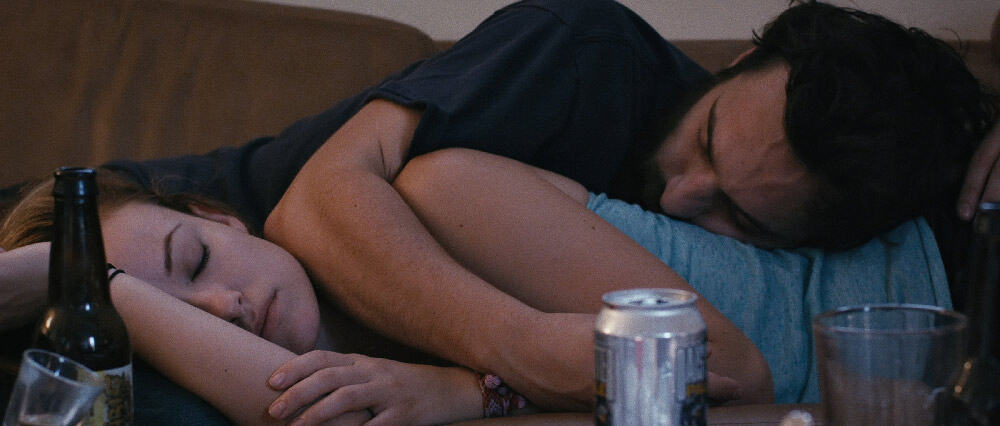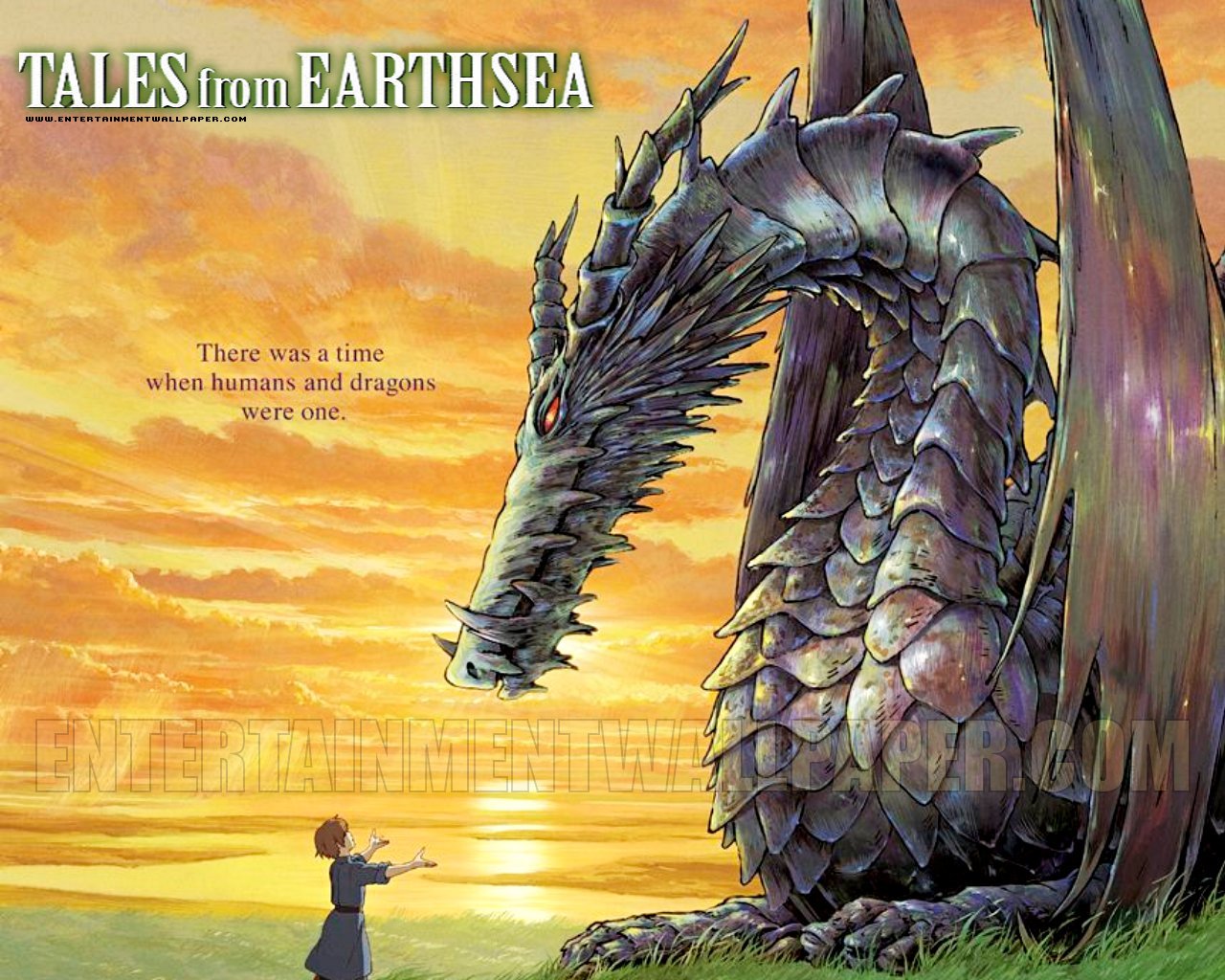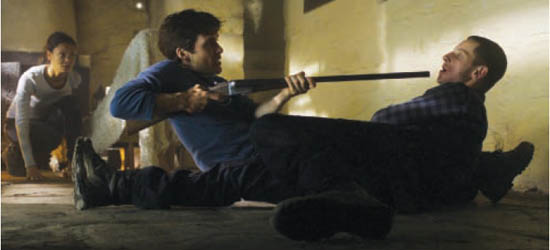An avid student of the depiction of youth in movies, I’ve taken to calling the twenties, as we live them nowadays, the benties, after the British word “bent,” for messed up. And, while I realize not everyone will have found this decade of late adolescence / imposed maturity as disconcerting as all that, I know for a fact that most Millennials will be hard-pressed to argue this point. It’s why we’re called the Me-Me-Me Generation after all: for us, the top-down pressure to grow up, move out and settle down rarely takes before the big 3-0 starts looming large. Perhaps, with a little less “luck” on our side, we too might look to the extraordinary lives of, say, Kelly Reichardt’s young female characters, and strive to fight adversity to heroic results. But, for the purposes of this list, we’ll concern ourselves with the simpler, not necessarily brighter, lot of the run-of-the-mill urbanite we can all relate to.
What do we end up doing during our twenties instead of the prescribed emotional growing? A lot of crazy indulging, most variations of which have thankfully been chronicled in movies of late. I say “thankfully” because I’ve realized in hindsight that many of the lessons learned the hard way and dilemmas faced head-on by twenty-somethings could lose much of their sting if we only spent more time watching heroes and, more to the point, antiheroes, tackle them on the big screen. Sure, making your own mistakes has its merits, but learning from others’ way of coming out the other end can be just as rewarding (and, at the price of a Netflix subscription, a lot less taxing).
Fulfilment anxiety
Take the twenty-something’s first major reality check, for a start: the nerve-wracking college experience. You might be thinking there aren’t that many pitfalls to look out for in your junior year aside from sleeping through an exam, but look closer and yes, you’ll find trouble, drama by the bucketful alongside dollops of fun. Not to make short work of that last bit, but I reckon we all would save ourselves a great deal of pressure if we just took Stella’s definitely not starry-eyed view of college at face value – to quote her, in Gregg Araki’s unapologetically mad Kaboom, “College is just an intermission between high school and the rest of your life. It’s four years of having sex, making stupid mistakes and experiencing stuff.” (For the record, you could watch Spring Breakers to get that lesson, and a six pack, down in one quickie gulp, but with Kaboom you’ve got a shot at doing some actual growth, no less so as a film buff).
Everything, it seems to us in college, is of consequence in the moment, and sure, there might be consequences, as with anything at any time in life, but the great perk of youth is that they’re easier to lose sight of… right? Those with artistic inclinations and a predisposition for wallowing in self-doubt will know that’s easier said than done when, like Aura in Tiny Furniture, the consequences of college are an impractical degree (filmmaking in her case) and a general lack of direction. College students and grads who tend to worry too much would do well to turn to Lena Dunham’s sophomore feature as well as its predecessor, the medium-length Creative Nonfiction, about an equally (plain old) chaotic in-college experience, whenever life seems to go off the rails. The freshman of the two – shot on campus with the help of friends and no budget to speak of from the shoddy looks of it – is about as close as any freshman youth is going to get to seeing their life on screen. It’s so common and familiar that it ends up looking like a genius bit of slice-of-life filmmaking, which doesn’t so much reveal anything new as it stresses the meaninglessness of the so-called “best years of our lives.” There’s a detachment to Lena’s helming, and her acting for that matter, that soothes the soul: a discerning observer will note that “the feeling of feelings” and the nightlong discussions thereof with friends or casual lovers are what college is really all about.
There’s no young filmmaker who does off-the-rails better than Lena, and as the writer, director and protagonist of Tiny Furniture, she excels at turning the self-involvement that’s central to all her work to good account: namely, helping relieve the pressure we put on ourselves when we’re young and fresh out of college. The purposefulness of youth, that our parents long to see in us, is something Lena’s Aura or Funny Ha Ha’s Marnie before her don’t bother with much – or, if they do, it’s for a masochistic split second, sandwiched in between longer periods of relinquishing the reins and relishing the havoc-wreaking, blundering young wanderer within. It’s not all that funny, grueling even at times, to watch these two aimless college grads floating between temp jobs while obsessing over boys, but it takes equal parts bravery and madness to stare down reality and shout the truth as they are, from the same rickety rooftop, eight years apart. It’s OK to be in the starting blocks with no track or finish line in sight – they’re telling us – live and breathe the confusion, and you just might happen on a direction.
Ships passing in the night, and icebergs
While most of the flicks on this slapdash list could be seen as falling under the Carpe diem category, there’s one sub-genre that really drives that motto across. The bleakest of all, which deals with the specter of death before one’s time. For some reason, out of all the movies dealing with mortality at a young age, a microscopic indie shot in the middle of the steadicam trend, Falling Overnight, stuck with me. The film centers on a budding love story, the first strands of which come together in the space of, you guessed it, one night between Elliot and Chloe. It’s a magical movie, mostly because of its dark undertones (Elliot is set to undergo massive surgery in the morning, to remove a brain tumor) that somehow set out the butterflies of love in glorious relief. The major decisions that we guess Elliot has had to make recently are now in suspended animation, unknown to Chloe, as is the boy’s imminent surgery: he allows himself the respite of saying “yes” to the girl’s off-the-cuff invitation to enjoy a carefree, fun-filled night with her. What better way to spend what might be his last hours, than total abandonment to the first flutters of love?
There are many other films that fit the forsake-all-others-see-what-happens bill – Two Night Stand is one that recasts the inimical force majeure as a blizzard and makes for far lighter fare – but not all romances weaved over a night or two of flirting end on a high note. I remember watching the Spanish film Stockholm, about a young couple coming together after a fleeting meet-cute at a party, and wishing the rumbling of impending doom was just in my head – only it wasn’t, and at the end of a whimsical and touching night of charming wooing on his part, reserved mystery, on hers, He (Goya winner Javier Pereira) was in the eye of that brewing storm. It’s a whirlwind, bittersweet idyl, this award-winning flick that did the festival rounds in Europe to much acclaim, and it manages to perfectly encapsulate the highest highs and the deepest lows of youth. The boundless, heady bullishness, on the one hand, and on the other, the childlike brittleness – acknowledging this clashing two-sidedness of youth in ourselves and each other is probably the most crucial test we’ll ever going to sit in our early twenties.
When is it time to… place your bets?
If taking blind, untenable risks is a cachet of young adulthood, as we edge into our late twenties, the stakes are higher, harder to scoff at. We still gamble, but we peak through the blindfold as we do, a bit more calculating, and a lot less idealistic about our chances. Uncertainty epitomizes the choppy seas of decision-making time, for me: sparked by the unvoiced news of a pregnancy, a drama and a thriller unfold side by side, snapping at each other’s heels like the child and the grownup inside the young adult. It’s maybe, probably, the coin toss at the very beginning that exerts such a pull, a happenstance that sends two first-time decision-makers down two alternate paths – what the coin chose for them and what could have been. The exhilarating plot device perfectly portrays youth on the brink of adulthood, most of us yearning to hang our fate on someone else’s shoulders. Or a coin toss. Uncertainty belongs to the contrived, pointed type of cinema that breaks through the tension of longed-for control in reminding the youth of the many realities spawning from every decision, and so, confirming none.
And then, there’s the go-to subgenre of independent auteurs: the shot-in-the-dark movies where the net is barely a cobweb and the characters jump, sparked by restlessness and rut. These are the movies that redefine love for, and largely by, the Millennial generation. Breaking Upwards, like Celeste & Jesse Forever and a host of others, stands on a quirky premise that youth writes its own rules in a playbook that it doesn’t quite change, but still, in the hedonic vacuum of the present tense, where no experience is needed to prevail. Twenty-somethings will stake everything on the shakiest whiff of self-confidence and an ardent hope for luck. In Breaking…, Zoe and Daryl (Daryl Wein, who also directs and co-writes with on-screen love interest Zoe Lister-Jones) move toward breaking up their 4-year-old relationship but, savvy and co-dependent Millennials as they are, disguise the rift in clear-cut baby steps. They hedge their bet by being apart just half the time. It comes as no surprise that their “days off” soon turn into flings with third parties, but the point the movie makes about the challenges young people face holds water: we often couch impulse in reason just for the comfort of having a well-laid, innovative crutch.
The twist to the adage today is that the one love, however “true,” may not always be the end-all-be-all for us, and that’s something we must learn, sooner rather than too late – nowadays, the great god of Tinder has decreed there’s no time to pine after a would-be soul mate. Not accounting for the great loves chronicled in films that paint couples with a smooth Shakespearean brush, as star-crossed and, therefore, surely meant to be (see the riveting Like Crazy for a taste), the real-life grind of love tells a less sure-footed story. And many independent filmmakers are eager to call it as it is: a lovers’ free-for-all. If too free, blame our culture and our inherited disregard for the cornucopia that marriage hardly ever was for our folks. As filmmakers and their audience near their thirties in lockstep, the “creative nonfiction” doled out by the former takes no liberties with the lay of the land.
The most recent perhaps, and among the most genuine declarations of Millennial independence to date (alongside, but short of the quirky delights of, (500) Days of Summer or Lola Versus), was writer-director Joe Swanberg’s Drinking Buddies – where Olivia Wilde and Jake Johnson douse their – our – particular brand of courtship in unchecked drinking, pheromones and taste for exploration. It’s a strong belief in more, in better, in question marks all over, that has led others to tag us as immature, Peter Pans, sufferers of “stunted growth” – but the extension of youth and its all-or-nothing ethos well into our thirties is the cornerstone of this guide. The obvious upshot of it, that thirty is the new twenty (gasp!), is the fountain of youth that sustains us.
Cast your net wide and your eyes far
Most of us, if we’re being honest, don’t have all that much in the way of shame, tragedy or even love to live down as we settle into our thirties. Still, there’s value in always having present in our minds that the adventures we live through when we’re young will end up being the lifeblood of our golden years. So, when you round the corner out of your more or less crazy twenties, I recommend you watch a movie about old age, the way you imagine yours to be. Like all journeys, youth is a whole lot easier to wade through when you’ve got some idea of the destination.
Browse through a bunch of hoary-haired flicks and find your one, zoom in on that old-fogey character that resonates most with how you see your life turning out. My latest favorite is a new addition to a rather short list I’ve put together over the years (twilight isn’t a very popular subject matter among filmmakers, unless it’s with a capital “T”) – a small UK flick called 45 Years, out last year. In it, an old couple reminisces about their youth – adventurous, filled with puppy love in lieu of children – and, as it turns out, after 45 years of marriage, some corners of their lives have yet to be broached. In between trips into town and planning their anniversary party, they do some meandering down memory lane, with revelations popping up along the way, as new memories form, and old feelings resurface, even now. You’ll see, sure enough, the supreme takeaway from this understated genre, for us youths, is, as Charlotte Rampling’s Kate puts it so insightfully: “I suppose we don’t realize it at the time, but those memories… they’re the things.” Sure, some memories turn out to be more haunting and fill us with more regret than we’d like, but when all’s said and done, one does hope to have the good with the bad to look back on, rather than nothing at all. Also, it’s a film that will help the control freaks among us realize that even if life takes the reins sometimes and makes the choices for us, it still might all turn up well enough in the end.
So, to all you twenty-somethings out there, the rallying cry is this: chill, loosen up your grip, live a little… Better yet, live a lot!
